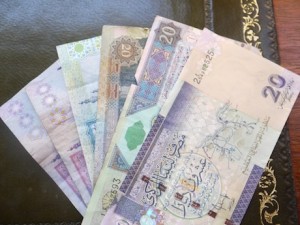By Moutaz Ali.

Tripoli, 16 May 2017:
The Libyan dinar has once again declined in value against the US dollar, hitting LD 8.50 in the black markets today.
However, the picture is somewhat unclear because of the enforced closure of some money dealers. One of the smaller players told the Libya Herald that while he had difficulty in operating, larger moneychangers continued to function and were, he claimed, to an extent rigging the market.
At the start of this month the dinar has recovered from around LD 9.00 to LD 7.80 to the dollar. However, the “price discovery” of the dinar’s value has been complicated by the enforced shutdown of some of smaller outlets, including much of the gold market in Tripoli’s old city.
What had been a market mechanism, since customers could in the past shop around for the best deal, has been disrupted. The market-making has been transferred to a few big dealers, whom their smaller rivals accuse of rigging the exchange rate to their own advantage.
“It is a trick by some giant currency dealers, who are in control of deciding the rate of the dollar,” former currency dealer Adel Ben Suliman told the Libya Herald.
“They sacrifice a certain amount of dollars which they circulate in the market at a lower rate. Then they buy all hard currencies in the market at this rate.” After few days, he adds, they will increase the hard currency rate “and reap huge profits”.
The economic fundamentals remain that despite injections of new currency, printed both in the UK and Russia (thus increasing the money supply and weakening the value of the dinar), people continue to hoard cash and the banking system remains remarkably illiquid. There are still queues every day outside bank branches as people try to get their hands on at least some of their savings, most particularly now, in the days leading up to Ramadan.
The lack of liquidity coupled with the printing of new money has combined to boost inflationary pressures which are reflected, albeit not all that clearly, in the dinar’s value against the US dollar and other hard currencies.






